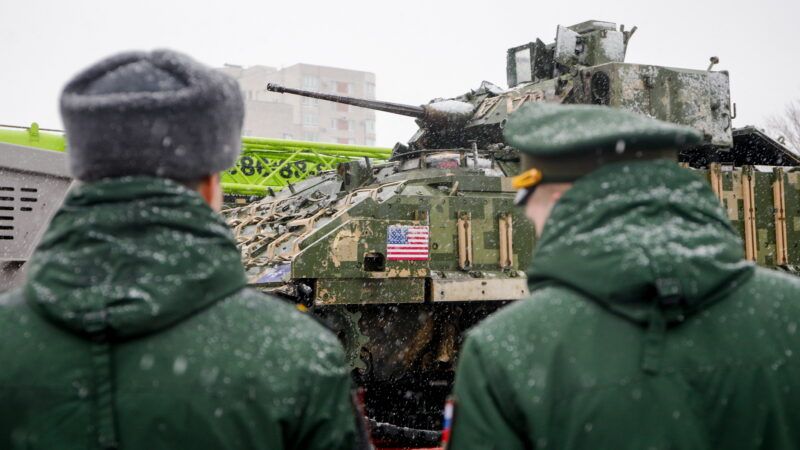Is Trump Getting Ready To Cut Ukraine—and Europe—Loose?
The push for Russian-Ukrainian peace is about more than Ukraine.

President Donald Trump started peace negotiations over Ukraine with dramatic flair. Although he had been expected to send his envoy Keith Kellogg to present a peace plan at the Munich Security Conference this week, Trump instead had a phone call with Russian President Vladimir Putin, announcing on Wednesday morning that they "agreed to have our respective teams start negotiations immediately." Along with the peace talks, the two countries announced a surprise prisoner exchange. And Trump snubbed Kellogg, leaving him out of the announced negotiating team.
European governments panicked at the notion that they would be left out of any final deal. "Peace can only be achieved together. And that means with Ukraine, and with the Europeans," German Foreign Minister Annalena Baerbock told reporters. "There will be no just and lasting peace in Ukraine without the participation of Europeans," French Foreign Minister Jean-Noël Barrot said to France's cabinet. Leaders across Europe made similar statements.
The talks about Ukraine are about more than Ukraine, and everybody on both sides of the Atlantic knows it. The new Trump administration seems eager to draw back from America's post-World War II role as Europe's military protector. In a speech on Wednesday, a few hours before Trump's announcement, U.S. Secretary of Defense Pete Hegseth called on the other members of the North Atlantic Treaty Organization (NATO) to pick up the tab for defending Ukraine and Europe.
"Our transatlantic alliance has endured for decades. And we fully expect that it will be sustained for generations to come. But this won't just happen. It will require our European allies to step into the arena and take ownership of conventional security on the continent," Hegseth said. "The United States remains committed to the NATO alliance and to the defense partnership with Europe. Full stop. But the United States will no longer tolerate an imbalanced relationship that encourages dependency. Rather, our relationship will prioritize empowering Europe to own responsibility for its own security."
Of course, Trump talked about having European countries pay a bigger share of defense in his first term, too. He also built up U.S. forces close to Russia's borders, and sent the first lethal military aid to Ukraine, mocking former President Barack Obama for giving Ukrainian troops only "pillows and sheets."
The stakes, however, are different now. During Trump's first term, the conflict was a war between the Ukrainian government and pro-Russia rebels. Since then, Russia has launched a full-scale invasion of Ukraine, leading to the most intense combat in Europe since World War II—and burning through U.S. resources. The threat of a direct U.S.-Russian war has loomed in the background.
Besides, the domestic politics have also changed. The Russiagate scandal and Trump's first impeachment trial have turned many Democrats into hawks on Russia and Ukraine, which has in turn polarized many Republicans in the opposite direction. Within the Republican camp, Trump has been cleaning house of old-style neoconservative hawks who want to dominate the whole world, and bringing in figures who want to prioritize confronting China or controlling Latin America instead.
"It's not normal for the world to simply have a unipolar power. That was an anomaly. It was a product of the end of the Cold War, but eventually you were going to reach back to a point where you had a multipolar world, multi-great powers in different parts of the planet," Secretary of State Marco Rubio told Fox News' Megyn Kelly last month. On Europe, he said that "there's a conversation to be had about whether the United States needs to be at the front end of securing the continent or as a backstop to securing the continent."
What hasn't really changed is what Russia and Ukraine want. Ukraine naturally wants to get back the land that was taken from it by force and to have guarantees against later invasions. Russia wants to keep the territory it has fought for—and then some—and to keep NATO or any other Western military presence out of Ukraine.
In his speech, Hegseth offered two major concessions. "Returning to Ukraine's pre-2014 borders is an unrealistic objective," he said, adding that "the United States does not believe that NATO membership for Ukraine is a realistic outcome of a negotiated settlement."
On the latter point, NATO members have tried to have their cake and eat it, too. German Chancellor Olaf Scholz, for example, told German radio last year that "a country at war absolutely cannot become a member of NATO." After all, NATO membership commits NATO countries to go to war for each other—and for that reason, the alliance requires unanimous consent to admit new members. But Western leaders have insisted on keeping their "open door policy" towards Ukraine on principle.
On the other hand, the Trump administration is also trying to have the best of both worlds. Instead of letting Ukraine join NATO, the Trump administration is offering Ukraine a security guarantee in exchange for U.S. access to rare earth minerals. Hegseth insisted in his speech that this guarantee will be "backed by capable European and non-European troops," and "there will not be U.S. troops deployed to Ukraine." In other words, the Trump administration wants to set the terms of a peace deal and reap the benefits while letting Europeans eat the costs.
This threat of being left behind might be exactly the push Europe needs to take control of its own security policy. European Commission President Ursula von der Leyen warned that "the world is changing fast" and "the United States has set a new agenda" in a speech last week. "It is time—and even high time—to take our security and defense into our own hands," she said. "NATO remains the foundation of our defense. But it is clear that we need an [European Union]-wide surge in defense."


Show Comments (65)